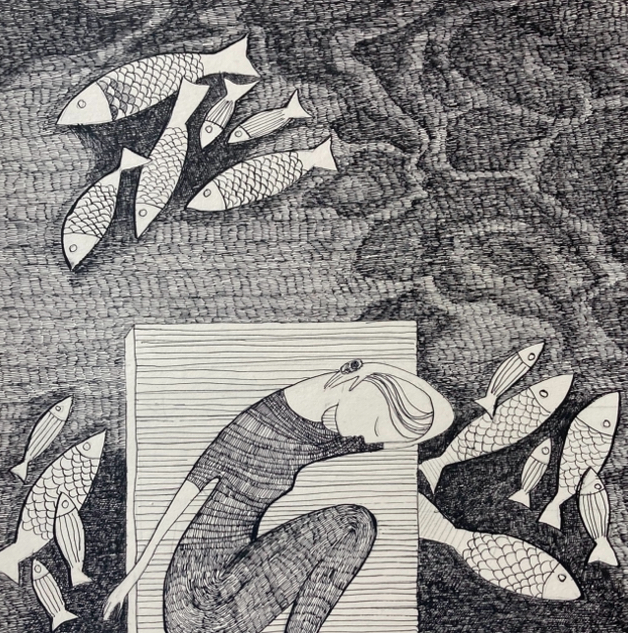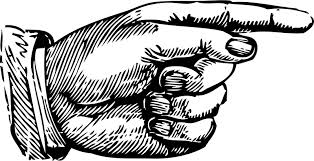Lie still. Wait.

Lie still.Wait.
"Wyczerpałaś się do cna. Nie zostało już nic, co mogłabyś ofiarować.
Połóż się, odpocznij. Połóż się jak rzeki skute lodem w zimowych dolinach.
Trwaj w bezruchu. Czekaj."
— Ursula K. Le Guin
Ostatnio nasz dom zalała potężna fala tsunami — stresu związanego z pracą.
Kryzys wciąż trwa i nie widać jego końca, dlatego przez najbliższy czas będę zaglądać na blog rzadziej niż dotąd.
Na rysowanie brakuje mi sił. Ale czytam.
Mówi się, że książki trafiają do nas wtedy, gdy ich najbardziej potrzebujemy — i rzeczywiście, "The left Hand of Darkness" Ursuli K. Le Guin spadła mi niemal jak z nieba.
To dla mnie baśń. Baśń fantasy, która przypomina, że samo światło nie wystarcza — że aby iść naprzód, potrzebujemy także cienia. Że złość i lęk potrafią być doskonałymi sługami, choć są kiepskimi panami.
Powieść zaczyna się przepięknie i z niezwykla madroscia— posłuchajcie:
"Złożę swój raport tak, jakbym snuła opowieść — bo w moim świecie już jako dziecko uczono mnie, że prawda jest kwestią wyobraźni.
Najpewniejszy fakt może zgasnąć lub rozbłysnąć — zależnie od tego, jak się go opowie.
Jak ten osobliwy, organiczny klejnot z naszych mórz, który jaśnieje, gdy nosi go jedna kobieta,
a u drugiej matowieje i obraca się w proch.
Fakty nie są bardziej trwałe, spójne, rzeczywiste czy pełne niż perły.
Ale jedne i drugie są wrażliwe."
Le Guin opowiada historię świata, który nie jest zdeterminowany przez różnice płci.
Świata, w którym człowiek z racji na swoja budowe oceniany jest wyłącznie jako człowiek — nie jako kobieta ani mężczyzna.
Nie ma tu podziału plci na silnych i słabych, opiekuńczych i zaopiekowanych, dominujących i podporządkowanych.
W takim świecie pojęcia patriarchatu i feminizmu tracą sens.
To właśnie tam przybywa wysłannik z odległej planety, by przekonać mieszkańców do przyłączenia się do międzyplanetarnej wspólnoty.
Ale najpierw muszą w niego uwierzyć — nie uznać za szaleńca czy dewianta.
I choć tylko jeden człowiek okazuje mu zaufanie, to właśnie jemu — przez kulturowe różnice — wysłannik ufa najmniej.
Trzeba wiedzieć, jak zadawać pytania. I jak nie odpowiadać na te, na które nie da się odpowiedzieć.
W czasie stresu — kiedy łatwo wpaść w pułapkę samokrytyki i surowego oceniania siebie — mądre książki psychologiczne uczą, by mówić do siebie:
"To trudne doświadczenie. Bądź dla siebie wyrozumiały. Bądź dla siebie życzliwy. Bądź dla siebie dobry."
W powieści Ursuli Le Guin podobne, skrajne doświadczenie przechodzą dwaj główni bohaterowie:
Therem Harth, mieszkaniec planety Winter, i Genly Ai, ziemski wysłannik.
Aby ocalić życie, muszą wspólnie przebyć Lodowiec Gobrin — 800 mil w surowych zimowych warunkach, w ciągu 85 dni.
To wyprawa wymagająca niewyobrażalnego wysiłku, wytrwałości i wzajemnego zaufania.
Ale ta droga prowadzi ich do celu.
Wspólne przetrwanie staje się doświadczeniem, które ich buduje i zbliża, a nawet wypelnia radoscia.
Może więc warto, w chwilach osobistego kryzysu, uzbroić się w cierpliwość i przejść przez swój własny Lodowiec Gobrin.
A o dobroci Le Guin w swojej ksiazce pisze tak:
"To coś strasznego — ta dobroć, której człowiek nie potrafi się wyrzec.
Strasznego, bo gdy w końcu stajemy nadzy, w ciemności i chłodzie — to właśnie ona nam zostaje.
My, tacy bogaci, pełni siły — na końcu zostajemy z tą drobną resztą.
Nie mamy już nic innego do ofiarowania."
I rzeczywiście — gdy wszystko wokół staje się trudne — pozostaje zawsze ta ludzka życzliwość.
Dla innych. I dla siebie.
Z miloscia.
K.
pssst... o Urszuli K. La Guin przeczytacie rowniez [tutaj].

Lie Still. Wait.
"You have spent yourself. There is nothing left to spend.
Lie down. Rest.
Lie down like the rivers frozen in the valleys of winter.
Lie still.
Wait."
— Ursula K. Le Guin
Lately, a great wave — a tsunami of work-related stress — has crashed through our home.
The crisis shows no sign of ending, and so, for now, I'll be visiting this blog less regularly than before.
I don't have the strength to draw.
But I do read.
They say books find us when we need them most — and indeed, "The Left Hand of Darkness" by Ursula K. Le Guin felt like it fell straight from the sky into my hands.
To me, it reads like a fairy tale — a fantasy tale that gently reminds us: light alone is not enough.
To move forward, we also need shadow.
That anger and fear can be excellent servants, though they make for terrible masters.
The novel opens with extraordinary beauty and wisdom — see for yourself:
"I'll make my report as if I told a story, for I was taught as a child on my world that truth is a matter of the imagination.
The soundest fact may fail or prevail in the style of its telling:
like that singular organic jewel of our seas, which grows brighter as one woman wears it and, worn by another, dulls and goes to dust.
Facts are no more solid, coherent, round and real than pearls are.
But both are sensitive."
Le Guin uses this story to imagine a world unshaped by gender —
a world where people are seen and judged only as human.
There is no division between stronger and weaker, nurturer and nurtured, dominant and submissive, active and passive.
In such a world, neither patriarchy nor feminism holds meaning.
Into this world comes an envoy from beyond the stars, tasked with inviting its inhabitants to join an interplanetary human alliance.
But for that to happen, they must first believe in him — not mistake him for a madman or a deviant.
And though only one person dares to trust him, the envoy, due to cultural differences, trusts that person the least. One must know which questions to ask — and how not to answer the ones that cannot be answered.
During times of stress, when we're prone to harsh self-judgment and inner criticism,
wise psychology books teach us to say:
"This is a difficult experience. Be gentle with yourself. Be kind. Be soft. Be good to yourself."
In Ursula Le Guin's novel, a similar trial is endured by the two main characters:
Therem Harth, a native of the planet Winter, and Genly Ai, an envoy from Earth.
To save themselves from certain death, they must cross the Gobrin Glacier —
800 miles in 85 days, through merciless, frozen terrain.
It is a journey that demands immense effort, endurance, and trust.
But it leads them to safety.
Their shared ordeal becomes something that transforms them — and binds them together and even fill them with pure joy.
Perhaps it is worth arming ourselves with patience, and walking through our own Gobrin Glacier.
And on the subject of kindness, Le Guin writes:
"It is a terrible thing — this kindness that human beings do not lose.
Terrible, because when we are finally naked in the dark and the cold — it is all that we have left.
We who are so rich, so full of strength —
in the end, are left with only this small change.
We have nothing else to give."
And truly — when all else around us falters — what remains is human kindness.
Toward others. And toward ourselves.
With love,
K.
pssst...
About Ursula K. La Guin you could read [here] as well.

And the grampophon plays ,,There are easier ways to desapear (but I am only good at this one) ' by Yara Asmar
Stay tuned!
K.